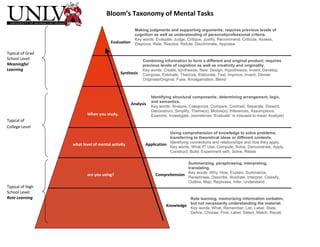Unlv Blooms Taxonomy Diagram
- 1. Bloom’s Taxonomy of Mental Tasks Making judgments and supporting arguments; requires previous levels of cognition as well as understanding of personal/professional criteria. Key words: Evaluate, Judge, Critique, Justify, Recommend, Criticize, Assess, Evaluation Disprove, Rate, Resolve, Refute, Discriminate, Appraise Typical of Grad School Level: Combining information to form a different and original product; requires Meaningful previous levels of cognition as well as creativity and originality. Learning Key words: Create, synthesize, New, Design, Hypothesize, Invent, Develop, Synthesis Compose, Estimate, Theorize, Elaborate, Test, Improve, Invent, Devise Originate/Original, Fuse, Amalgamation, Blend Identifying structural components; determining arrangement, logic, and semantics. Analysis Key words: Analyze, Categorize, Compare, Contrast, Separate, Dissect, Deconstruct, Simplify, Theme(s), Motive(s), Inferences, Assumptions, When you study, Examine, Investigate, (sometimes “Evaluate” is misused to mean Analyze) Typical of College Level Using comprehension of knowledge to solve problems; transferring to theoretical ideas or different contexts. what level of mental activity Application Identifying connections and relationships and how they apply. Key words: What if? Use, Compute, Solve, Demonstrate, Apply, Construct, Build, Experiment with, Solve, Relate Summarizing, paraphrasing, interpreting, translating. are you using? Comprehension Key words: Why, How, Explain, Summarize, Paraphrase, Describe, Illustrate, Interpret, Classify, Outline, Map, Rephrase, Infer, Understand Typical of High School Level: Rote Learning Rote learning, memorizing information verbatim, but not necessarily understanding the material. Knowledge Key words: What, Remember, List, Label, State, Define, Choose, Find, Label, Select, Match, Recall,
